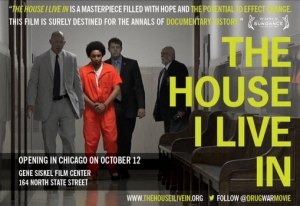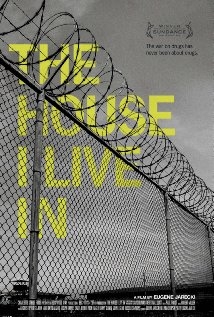I had entered the lobby of The Art Theatre in downtown Champaign many times before Tuesday evening, but never had I walked into a scene like the one that greeted me on the night I came to view and review The House I Live In. For one thing, there were more people buzzing about than I was accustomed to. It occurred to me that this might have something to do with the fact that it was a free screening. Why wouldn’t people show up for a free movie? But a movie–a documentary–about our country’s War On Drugs and its impact on society…?
Having stepped through the door, I was greeted by a volunteer, an organizer, who stood by a table of leaflets and survey forms. There was a plain white plastic bucket on the table on which the word “Donations” was written in marker. He asked if I would like to sign up for a mailing list, saying that they would be sending out information about their “campaign against the jail.” I signed my name.
 I showed up early, as I usually do, but even as I stepped into the auditorium to find my seat a good twenty minutes before showtime, it was clear that this event would be well attended. I found a seat in the back, figuring it would be a good vantage point from which to observe the audience as well as the film, and over the course of the next half-hour, the room filled beyond capacity. I had never before attended a film that was literally Standing Room Only, but here I was, every seat filled, people lining the walls, people sitting in the aisle.
I showed up early, as I usually do, but even as I stepped into the auditorium to find my seat a good twenty minutes before showtime, it was clear that this event would be well attended. I found a seat in the back, figuring it would be a good vantage point from which to observe the audience as well as the film, and over the course of the next half-hour, the room filled beyond capacity. I had never before attended a film that was literally Standing Room Only, but here I was, every seat filled, people lining the walls, people sitting in the aisle.
Holy shit, I thought. Who are all these people? And, concurrently, What is this film? I am not an activist. I saw a trailer for a film, thought it looked interesting, and showed up. I had no solid information about what I was about to watch. In other words, this film was made for someone like me.
It would be another ten minutes or so, even after the crowd filed in, before I would find out. First, a gentleman from CUCPJ (Champaign-Urbana Citizens for Peace and Justice) stood and addressed the crowd, giving some shout-outs and alerting the assembled masses to upcoming events and ongoing concerns within the community. I was handed a flyer for a series of talks to be held in Levis Faculty Center and Salem Baptist Church, the topic of which was to be “The Negative Impact of the War On Drugs In Our Community.” As I glanced at it, the young man who gave it to me said, “If you’re just gonna throw it away, I’ll take it back.” I assured him I wouldn’t throw it away.
Another flyer would await me as I walked out of the theater some 108 minutes after  the lights went down and the film began. This flyer urged me to attend the Champaign County Board Meeting on February 21 at 7:00 PM in the Brookens Administration Building. The topic of this meeting? Building a new jail at an estimated cost of $20 million. 108 minutes earlier I might not have given the proposed plan a second thought. I am, after all, the son of a (now retired) corrections officer.
the lights went down and the film began. This flyer urged me to attend the Champaign County Board Meeting on February 21 at 7:00 PM in the Brookens Administration Building. The topic of this meeting? Building a new jail at an estimated cost of $20 million. 108 minutes earlier I might not have given the proposed plan a second thought. I am, after all, the son of a (now retired) corrections officer.
But 108 minutes can be a long time. Long enough to illuminate some facts, to download some knowledge into an audience’s collective brain. Long enough, perhaps, to tell the truth.
The House I Live In is, in the broad strokes, a documentary about our country’s so-called War On Drugs and its impact on our nation’s people. Directed by Eugene Jarecki, whose previous films include Why We Fight and Freakonomics, this film was the winner of the Grand Jury Prize for Documentary at the 2012 Sundance Film Festival and has an impressive roster of producers, including (among others) Danny Glover, Brad Pitt, John Legend, and Russell Simmons.
 According to the documentary’s official website:
According to the documentary’s official website:
Filmed in more than twenty states, The House I Live In tells the stories of individuals at all levels of America’s War on Drugs. From the dealer to the narcotics officer, the inmate to the federal judge, the film offers a penetrating look inside America’s criminal justice system, revealing the profound human rights implications of U.S. drug policy.
The film does exactly that, capturing the tension of a young man facing 20 years in prison due to Mandatory Minimum sentencing as well as the frustration of the judge who believes the sentencing guidelines are unjust but whose hands are tied by the complexity of the law. There are also recurring vignettes devoted to a small town Texas sheriff who sees profiling as common sense as well as a 20-year veteran of the Department of Corrections who describes himself as “law and order all the way” but has a refreshingly logical and open-minded attitude toward a society that thrives (and profits) on naming its enemy and monetizing that enemy’s punishment.
The touchstone of Jarecki’s narrative structure is Nannie Jeter, an elderly African-American woman who was Jarecki’s parents’ housekeeper when he was a child. He chronicles her family’s struggle with drugs, jail, and suffering, then expands his scope to include such disparate sources as Ivy League academics, incarcerated felons, investigative journalists, and experts on medicine, law, and civil rights.
Of all the voices contributing to Jarecki’s sobering and informative pastiche, two resonate so clearly as to practically shout. One is the voice of renowned Abraham Lincoln scholar Richard Lawrence Miller, who, in conducting historical research, found disturbing patterns in America’s attitude toward and enforcement of drug policy dating back further than Abolition.
Miller’s conclusions on this country’s use of drug policy to demonize and marginalize minorities throughout American history are echoed in the sentiments of the other Great Voice of the documentary, that of television writer/producer David Simon (The Wire) who says, “The Drug War is a holocaust in slow motion.”
Jarecki is wise to save this sound bite until relatively late in the film. It’s a great line and packs a wallop, certainly, but by the time Simon utters it, it’s all too easy to believe.
The House I Live In is not a flashy film, nor is it a dry sociology lecture. It is  structurally smart and engrossing, touching on decades of political rhetoric and constructing an argument that stays with the viewer long after the lights come back up. It manages to vilify the corporate machine that profits on the Drug War without excusing drug use or drug dealing. It manages to show that drug enforcement officers are, for the most part, hardworking individuals with good intentions while pointing out the glaring flaws in the system and showing the audience that these officers, bound to do their duty, are well aware of these flaws.
structurally smart and engrossing, touching on decades of political rhetoric and constructing an argument that stays with the viewer long after the lights come back up. It manages to vilify the corporate machine that profits on the Drug War without excusing drug use or drug dealing. It manages to show that drug enforcement officers are, for the most part, hardworking individuals with good intentions while pointing out the glaring flaws in the system and showing the audience that these officers, bound to do their duty, are well aware of these flaws.
It shows, ultimately, that the House of the film’s title is not a prison, as one might suspect. Instead, the House is a country; it is a culture. And we, as Americans, all live there. In fact, as the film drew to a close and I thought of this House, I couldn’t help but think of a phrase repeated often during the last presidential campaign….
We built it.
The House I Live In has one more screening at The Art on Wednesday, February 5, at 7:30 PM. Time is tight, so don’t hesitate. I highly recommend this film and hope the next showing is as packed as the one I attended.
Check out the trailer here. It’s just a taste; if you’re like me, maybe it won’t be enough.








